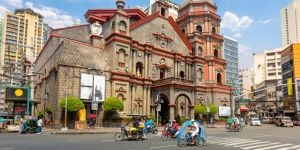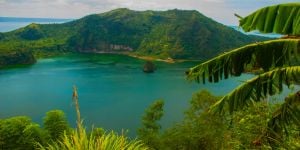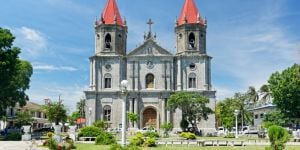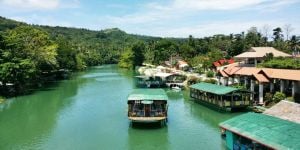U.S. documents: Philippine Defense treaty does not cover Spratlys, Scarborough
By Rigoberto Tiglao November 28, 2022 https://www.manilatimes.net/2022/11/28/opinion/columns/us-documents-defense-treaty-does-not-cover-spratlys-scarborough/1868090
The question of American military support for the Philippines in any territorial disputes in the South China Sea has long been settled and documented: The Mutual Defence Treaty does not recognize the Philippines' and three other nations' territorial nor maritime claims in the Spratlys or nearby.
Therefore the US cannot intervene in any disputes if an armed conflict breaks out in that area of the South China Sea.
It was President Ferdinand E. Marcos, the current president's father, who demanded that the Americans give him a clear written statement on this issue, way back in 1976.
As reported in the 1976 document "Memorandum From the President's Assistant for National Security Affairs to President Ford" the US State Department told then President Gerald Ford:
"President Marcos has asked us for a clear written statement of whether we will respond under the Mutual Defense Treaty if his forces are attacked while operating in the Reed Bank in the Spratlys. Marcos made clear that a formal answer on this question must precede any further progress on the base negotiations."
By "negotiations," Scowcroft was referring to the talks between the US and the Philippines in November 1976 to change the terms of the Military Bases Agreement.
As well as Marcos' demand for a $2 billion "rent" for the next five years, the other big obstacle to a new agreement was his insistence on a declared US commitment to defend Philippine forces in the areas in the South China Sea that his nation as well as China, Vietnam and Taiwan claim.
Reed Bank
Marcos had then just authorized a private consortium of Swedish and Filipino companies — in which the American Oil Co. (Amoco) had a minor stake — to explore for gas and oil in the Reed Bank at the northeastern corner of the Spratlys.
This is the same Reed Bank, where a vessel of the First Pacific-Enrique Razon partnership attempted to survey for natural gas reserves in 2011. The vessel was blocked and shooed away by Chinese civilian government vessels — triggering President Aquino 3rd's belligerent stance against China.

Marcos troops' had occupied eight islands in the Spratlys from 1970 to 1971, which were intended to be military bases to defend the consortium's exploration of the Reed Bank, which was totally submerged and therefore could not have bases.
China and Vietnam vociferously opposed the occupation, claiming these areas were part of their sovereign territory, but could do nothing. China was then in a deep political and economic crisis because of the euphemistically called "Great Proletarian Cultural Revolution."
Vietnam was debilitated by its civil war with the communist North although it managed — prodded by American oil exploration firms — to occupy six features in the Spratlys from 1973 to 1974, or before the conflict ended in November 1975.
Deterrent
Marcos apparently was concerned that the battle-hardened troops of the North Vietnamese Army would attack Philippine forces in the Spratlys.
As a deterrent to such possibility, Marcos asked the US to send a clear public message it will defend Filipino forces in the Spratlys by its 1951 Mutual Defense Treaty. Marcos told the American negotiators he would agree to a new Military Bases Agreement only if the US made such a declaration.
The Americans didn't.
Scowcroft explained to Ford in his memorandum: "As disputed areas, the Spratlys and the Reed Bank can be defined as territory to which the treaty would not apply. However, the broader reference to forces, vessels or aircraft 'in the Pacific,' could be interpreted to cover Philippine units attacked in either the Spratlys or the Reed Bank. We have consistently declined to take a position on any of the claims to the Spratlys and the Reed Bank."
The US ambassador to Manila at the time, William Sullivan, also recommended in his November 1976 telegram to the State Department secretary, that they should inform the Filipino negotiators that the MDT commits the US to defend from armed attack only the Philippines' "metropolitan territory."
Sullivan claimed these refers only to the "land areas delineated in the (1898) Treaty of Paris" as the Philippines' territory, which excludes the Spratlys and Scarborough Shoal.
Scowcroft in his memorandum explained why and how the US, rather than explaining to Marcos the limits of the MDT, should respond ambiguously, which to this day is the template of the US government's public stance on the issue.
Three responses
"Essentially, there are three responses we can give to Marcos on this issue: an affirmative one clearly extending our commitment to cover Philippine units attacked in the Reed Bank; a negative one definitely excluding the area from our defense commitment; or an ambiguous one restating our overall defense commitment to the Philippines but leaving unanswered whether we would respond to all attacks on Philippine units in the area.
"A clearly negative response to this issue may at the very least be expected to complicate gravely our current task of renegotiating the bases agreement. It could well lead to tighter restrictions on the use of our bases, e.g., for support of activities in the Indian Ocean.
"On the other hand, any strongly affirmative response to Marcos will bear at least equal risks. It would increase the possibility of tensions with the PRC and Vietnam. Congress and the public would probably see such a position as an unnecessary expansion of our defense commitment.
"Finally, a forthcoming response might encourage Marcos to pursue his claims to the Spratlys more actively, and to use military force to protect such claims.
Ambiguous
"State and Defense recommend that you authorize our making an ambiguous reply. In it we would state that we would consider Philippine units operating in the Reed Bank as covered by our defense treaty as long as their presence is consistent with the provisions of the Mutual Defense Treaty, particularly Article I regarding peaceful settlement of disputes and refraining from the threat or use of force."
In short, the recommendation was to tell the Philippine government that the US will defend its forces if attacked, as long as it first settles the dispute peacefully, and does not threaten force or use force in the disputed areas.
The document indicated Ford approved with his signature. Forty-six years later, the dispute over the Spratlys had not been settled peacefully.
Then President Aquino 3rd in 2012 foolishly sent the Navy's largest warship, the RP Gregorio del Pilar, to Scarborough Shoal to assist the civilian authorities going after Chinese fishermen allegedly fishing endangered species.
China saw it as a "threat to use force," which for the US invalidated the MDT.
Taking advantage of the Philippines' lack of patrols and of a surveillance system, the Chinese occupied unchallenged seven reefs in 1988, another in 1994.
They then transformed these into huge artificial island fortifications in 2012, in retaliation against the Aquino regime's arbitration suit against China.
After the seven reefs that Vietnam also occupied in 1988, they seized eight other features in the Spratlys from 1989 to 2016, building their own kind of fortifications on many of these.
In the South China Sea disputes, the Mutual Defence Treaty has been totally, absolutely, incontrovertibly useless.
--













